|
|
|
Sort Order |
|
|
|
Items / Page
|
|
|
|
|
|
|
| Srl | Item |
| 1 |
ID:
184333
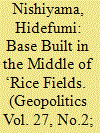

|
|
|
|
|
| Summary/Abstract |
This paper explores the role of ignorance in contemporary imperial geopolitics and the political geography of islands. Ignorance and imperialism have gone hand in hand since as early as the European age of ‘discovery’. The idea of empty spaces empowered earlier European colonial expansion by ignoring the existence of non-white indigenous people and communities. A few centuries later, the cartographic discourse of empty spaces still appears to be at work today in islands such as Okinawa where US bases have been stationed since the mid-twentieth century. The paper conducts a study of ignorance, or an agnotological study, of Okinawa. There has been a growing interest in studies of ignorance in the past few years, notably in sociology, science and technology studies, and studies of race and racism. Yet, ignorance as a focal point of analysis seems to be underdeveloped in studies of geopolitics and islands despite that the production of ignorance contributes to the maintaining of existing imperial spatial orders. The paper particularly examines the dominant discourses of US officials around the history of Marine Corps Air Station Futenma, which often ignore, or disguise at best, the colonial foundation of military bases in Okinawa.
|
|
|
|
|
|
|
|
|
|
|
|
|
|
|
|
| 2 |
ID:
184331


|
|
|
|
|
| Summary/Abstract |
The paper examines the geopolitics of the Falun Gong (FLG) and how its practices challenge the legitimacy of the Chinese Communist Party’s (CCP) authority within the Chinese state. Drawing upon Laclau and Mouffe’s concept of discourse, I analyse the FLG’s scriptures in order to understand how its millennial ideas of ‘telling-truth/saving-life’ and ‘reviving five thousand years of civilization’ have developed since the People’s Republic of China’s (PRC) ban and crackdown on the FLG since 1999. Based on the FLG’s resources and my fieldwork data, this paper also demonstrates how the concepts of ‘telling-truth/saving-life’ were practised and coordinated globally. This paper presents the dynamic relationship between spirituality and geopolitics. It demonstrates how politics are spiritually interpreted and how critical spiritual discourses are converted to geopolitical practices that challenge the authority of an atheist state.
|
|
|
|
|
|
|
|
|
|
|
|
|
|
|
|
| 3 |
ID:
184327


|
|
|
|
|
| Summary/Abstract |
During the mid to late 1980s tens of thousands of Tamils from Sri Lanka sought and got asylum in Canada, forging the basis of the sizeable diaspora today. The Canadian state granted overwhelmingly positive decisions to Tamil refugee claimants based on evidence that the Government of Sri Lanka colluded in systematic violence against and killing of Tamil civilians who were not part of the militant separatist rebel group known as the Liberation Tigers of Tamil Eelam (LTTE). Canada continues to accept a majority of Tamil asylum seekers today, and hosts diaspora geopolitics – a less state-centric politics among diaspora members – ‘from below’.
|
|
|
|
|
|
|
|
|
|
|
|
|
|
|
|
| 4 |
ID:
184335
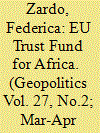

|
|
|
|
|
| Summary/Abstract |
As a response to the migration crisis, the EU has not only revised its policies but also mobilized resources, introduced new tools, or adapted the existing ones to the changing context. While the debate at the policy level is burgeoning, instruments have been limitedly explored. What kind of geopolitical dynamics are EU migration policy instruments producing? How do they contribute to redesigning the EU-African geopolitical space? The article combines a policy instruments approach with a spatial perspective on the EU migration policy. Through the analysis of the 2015 EU Emergency Trust Fund for Africa, it raises the argument that migration policy instruments are powerful spatial practices that are shaping the EU-African geopolitical space by coordinating the EU’s and Member States’ priorities and understandings of migration. Overall, the paper suggests that research on the EU external relations, particularly in the realm of migration, should not only pay more attention to policy instruments but also map them in the targeted territories to avoid “cartographic traps” and better understand the impact of the policies under scrutiny.
|
|
|
|
|
|
|
|
|
|
|
|
|
|
|
|
| 5 |
ID:
184336


|
|
|
|
|
| Summary/Abstract |
In this paper we argue that superhero cinema offers an opportunity to think through the narratives and affects of the refugee crisis, which are distinct from, but related to, the relatively well-attended-to tropes of journalism. To do so we adopt both the ethical stance of feminist political geography and the analytic methods of popular geopolitics. Our analysis focuses on two films from the burgeoning Marvel Cinematic Universe (MCU): Thor: Ragnarok and Captain Marvel. Both films are not ‘refugee films’ per se, but they illustrate the ways in which the ongoing ‘refugee crisis’ is being dealt with in mainstream, corporate Hollywood blockbusters. The two films are considered both in their narrative and affective engineering, as part of an effort to understand the ways in which political subjects might be shaped by the act of viewing. Our analysis uncovers three themes: 1) mobility as power, 2) the aesthetic of modernity, and 3) refugee bodies. We conclude that studies like this can contribute to a broader understanding of the role of whiteness and securitisation in the portrayal of refugees in the Global North.
|
|
|
|
|
|
|
|
|
|
|
|
|
|
|
|
| 6 |
ID:
184328
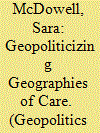

|
|
|
|
|
| Summary/Abstract |
Each year thousands of people seeking better lives in Europe make the treacherous journey across the Mediterranean. Many of those struggling or stranded at sea are rescued by ‘boat people’ comprising NGOs, humanitarian organizations, coast guards and merchant vessels. Under maritime law there is a duty of care towards anyone that experiences difficulty at sea. There is, too, a duty of care by States who under the same law are required to assist ships and allow the disembarkation of those in danger. Yet this practice has important legal, ethical and practical implications and has been challenged by right-leaning political regimes who, making good on election promises to ease immigration, have prohibited such vessels to dock at their ports. This paper, using a case study approach of the humanitarian vessel the Aquarius, considers the ways in which the geographies of care intersect and collide with the geopolitical framing of migrants and refugees. In doing so the paper makes two important contributions. First, it extends conceptualizations of care geographies which are more typically applied to the spatial outworking of health and wellbeing to European migration. It thinks about how care is administered, contested and politicized. The complex concept of care offers a rich lens through which to critique the framing of seaborne migrants and refugees in Europe. Through giving or circumventing legal responsibilities to provide care, seaborne migrants are either humanized or dehumanized. Second, through unpacking the legislative and ethical frameworks shaping search and rescue (SAR) activities in the Mediterranean, we can observe a distinct ‘geopoliticizing of care and responsibility’ whereby these individuals become pawns in wider power dynamics within the European Union.
|
|
|
|
|
|
|
|
|
|
|
|
|
|
|
|
| 7 |
ID:
184330


|
|
|
|
|
| Summary/Abstract |
This paper critiques the legitimisation of linear borders in mainstream international relations (IR) through a focus on postcolonial South Asia. It brings insights from political geography in conversation with IR, making three key arguments: 1. The knowledge production on bordering in postcolonial South Asia remains trapped within the cognitive confines of linear bordering 2. Problematising linear bordering can therefore lead to newer critical questions about partition/bordering in South Asia, such as: is there a way to delink democracy and political independence from linear and precisely defined territorial borders? 3. Linear bordering in South Asia has been constitutive of the identities it aimed to isolate. The paper builds its arguments from an IR perspective and relies on IR’s treatment of borders, and scholarship on state formation and partition in postcolonial South Asia, to make its case. The paper understands linear borders as straight lines connecting a series of dots on a map in a way that one territory can only fall into one polity. This linear bordering was first attempted by colonial powers in Africa and then transported to other parts of the world. In South Asia, it produced reification of identities thus making divisions of territories appear as simple solutions to vastly complex challenges of identity formation.
|
|
|
|
|
|
|
|
|
|
|
|
|
|
|
|
| 8 |
ID:
184324


|
|
|
|
|
| Summary/Abstract |
Wars and conflicts around the world take the lives of millions and leave millions more displaced both physically and emotionally. With an unprecedented number of displaced peoples worldwide, the plight of refugees, stateless, and internally-displaced people remains a crucial global issue. The current COVID-19 pandemic and subsequent growth of restrictions and barriers to mobility and resettlement have further exacerbated the challenges faced by displaced persons.
|
|
|
|
|
|
|
|
|
|
|
|
|
|
|
|
| 9 |
ID:
184334
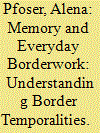

|
|
|
|
|
| Summary/Abstract |
The field of border studies has traditionally paid little attention to questions of temporality, leading to criticisms over its presentism and lack of historical reflexivity. A number of recent publications have brought temporal questions more centrally into border research, examining the changing and historically contingent nature of borders. This article intervenes in this body of scholarship, using memory as a means of studying the past and present of borders. Bringing border studies scholarship into a more systematic conversation with memory studies, the article shows how memories of the past play an important part in the symbolic construction of borders, and that processes of remembering are central to how citizens produce borders in everyday life. The focus on memory and everyday borderwork allows to go beyond linear and uniform conceptions of time that have shaped the writing on border temporality. It draws attention to how time is ordered and interpreted in non-linear and multiple ways and how these temporal orderings confirm, extend or question the meanings of borders. The usefulness of studying memory in everyday borderwork is exemplified through an analysis of memory narratives in the Russian-Estonian borderland, based on extensive fieldwork and the analysis of 58 narrative life-story interviews.
|
|
|
|
|
|
|
|
|
|
|
|
|
|
|
|
| 10 |
ID:
184326
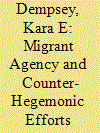

|
|
|
|
|
| Summary/Abstract |
Migrants who reach EU asylum camps face various forms of spatialised violence that are bolstered by or produced within these geopolitical protracted spaces of waiting. Segregated from society, migrants experience processes of displacement, alienation and vulnerability as their legal status restricts their mobility and postpones employment or education opportunities. They are simultaneously suspended in a state of continuous disruption as they move through a series of camps while waiting for a decision on their applications. In remonstration, some migrants develop advocacy networks within and across camps in an attempt to challenge the hierarchical control of the everyday spaces and politics that migrants encounter in camps. Drawing on original fieldwork, this paper interrogates the intersection of the spatial production of geopolitical violence in camps and migrant agency within these distinctive political spaces. I argue that a state-centred examination of spaces of violence and migrant agency fails to attend to embodied and emotional landscapes when problematising the geographies of camps and those waiting in interim zones of confinement. In contrast, this examination of the embodied migrant experiences and advocacy networks brings the geopolitics of human and affective matter to the forefront. In this way, the article highlights migrant agency in response to their lived experience and the embodied geopolitical violence of control, categorisation and exclusion that is produced in the various spatialities of asylum seeking.
|
|
|
|
|
|
|
|
|
|
|
|
|
|
|
|
| 11 |
ID:
184337


|
|
|
|
|
| Summary/Abstract |
Mosques in Europe have long been and are still at the centre of political debates, despite the decades-long presence of migrant Muslim communities in Europe. Scholars within geography and other disciplines have studied mosques extensively with a focus on urban space politics, and examined tensions and conflicts between migrant mosque communities and the broader segments of the local people. In this paper, I focus on DITIB, a Turkish umbrella mosque organization in Germany, and I carry these debates into a transnational terrain, re-theorizing mosques not only as political sites, but also everyday geopolitical spaces where national imaginaries and territorial struggles take place in the daily lives of mosque communities. Through this approach, I draw on the studies of feminist geographers who have provided a renewed perspective to classical geopolitics discussions by revealing how geopolitical relations, struggles, and interactions also operate in everyday spaces, relations, and bodies of ordinary people by reproducing the deep-seated exclusions, discriminations and contestations. This paper contributes to critical geopolitics and geographies of religion literatures as well as to broader discussions on the geopolitics of religion by analysing how a mosque organization is situated at the centre of geopolitical tensions, and how transnational and transregional controversies operate on the walls and properties of mosques and in everyday social/cultural activities of mosque communities.
|
|
|
|
|
|
|
|
|
|
|
|
|
|
|
|
| 12 |
ID:
184329


|
|
|
|
|
| Summary/Abstract |
In traditional geopolitical discourses, an individual’s very being is routinely tied to and predicated upon the sanctity of the individual’s nation-state. The global refugee regime operates upon this assumption and regulates those who have been forcibly displaced from their homelands. Feminist geopolitics offers a way to see beyond the rigid boundaries of nation-states and attend to the embodied, lived, intimate and everyday experiences of people and their situated realities in any given time/space intersection. In this article, I explore questions of place and displacement through the story of one man’s journey from his village in Somalia to his eventual resettlement in Tucson, Arizona. Through Abdi’s story, this article seeks to contribute to geographic understanding of the immanence of place to self as it relates to displacement and forced mobility. Abdi’s story and his journey from Migwa to Tucson illustrate the nomad potential of his connection and disconnection to various places he has inhabited. His story and lived experience provide a nuanced example of the context of human relations with the places they inhabit and how these relations are much more fluid and porous than that assumed in the model of the ‘geographical self’- the self that is deeply rooted in and defined by places. This story-based approach reclaims human agency in the dyadic connection between place and self and centers individual experience in a geographic study of forced mobility and displacement.
|
|
|
|
|
|
|
|
|
|
|
|
|
|
|
|
| 13 |
ID:
184338


|
|
|
|
|
| Summary/Abstract |
Simon Dalby has most fervently argued to reframe various current security challenges as ‘anthropogenic geopolitics’. This paper takes up Dalby’s call discussing theoretically classical as well as critical readings of geopolitics arguing that both are helpful analytical lenses that do, however, focus on very different aspects. Empirically, these two geopolitical frames are used for an analysis of the current boom of renewable energies. The paper thus first analyses geographic and territorial determinants of the new energy revolution showing the relevant, but overall more benign conflict potential RE might entail and does so regarding material input, RE installations, storage and the grid system. In a second step, the spatial politics of RE are debated with a focus on the German energy transition arguing that a new regional geopolitical discourse has emerged after the Ukraine crisis. The paper is a critical – although normatively favourable – reading of the promise of Prometheus and the potential unintended consequences that are in store in Pandora’s box claiming that in the end the fulfilment of RE’s potential depends on politics.
|
|
|
|
|
|
|
|
|
|
|
|
|
|
|
|
| 14 |
ID:
184325
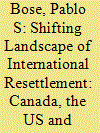

|
|
|
|
|
| Summary/Abstract |
The world is today in the grip of the worst forced migration crisis since the end of the Second World War, with tens of millions driven from their homes by conflict. Yet the global system meant to provide protection to the displaced continues to privilege the interests of nation-states rather than those of refugees and has resulted in less willingness by many countries to accept refugees for resettlement. The arrival – actual or potential – of large numbers of refugees and asylum seekers continues to spur a backlash against them, fuelled by fears of security threats, economic costs, and a lack of integration of newcomers. This situation has combined with xenophobia, racism, and broader cultural anxieties and led to a rising tide of nativist populism and even less welcome for those seeking sanctuary. Whereas by the late 1990 s the dominant logic governing refugee protections – at least in name if not in practice – was centred on multilateralism and humanitarian obligations, today there is a more explicit prominence of national interests in refugee policies. In this paper I argue that the continued dominance of nation-state centric priorities is indicative of the fragility of the global refugee regime. I use the example of Canadian and US responses to the Syrian refugee crisis and interviews with officials in each country to illustrate the primacy of national interests rather than international agreements and norms. The US chose to limit and eventually bar most Syrians from resettlement whereas Canada chose to accept a large number over a short period of time. I argue that both cases reveal similar patterns and logics, if not outcomes and an increasing alignment between border controls and immigration policy. I consider what this means for the future of refugee resettlement in North America and for the global refugee regime more broadly.
|
|
|
|
|
|
|
|
|
|
|
|
|
|
|
|
| 15 |
ID:
184332


|
|
|
|
|
| Summary/Abstract |
This article aims to tackle the inner-regional question within political geography debate addressing an important conceptual and empirical deficit in our understanding of periphery as political construct. It analyses the role of state spatial-making in the process of constructing the narrative of peripherality of subnational territories, in national-territorial politics. It examines the concept of ‘inner region’ as it is employed in state spatial strategy focusing on territories that are ‘locked’ into a configuration outside the core, that is, territories that are peripheral and remote. In particular, study’s concern is with the geopolitical rationality that implicitly guides policy framework in the National Strategy for Inner Areas (SNAI) and the new Metropolitan Cities in Italy. If inner regions and city-regions become a particular expression of state space-making, their development offers considerable opportunity for shedding more light on the relationship between local dynamics and wider geopolitical relations. Against the only apparently neutralizing discourses of citizenship, polycentrism, and economic development which dominate that policy, the new strategy is a highly geopolitical instrument potentially accelerating the neoliberalization of peripheral regions.
|
|
|
|
|
|
|
|
|
|
|
|
|
|
|
|
|
|
|
|
|